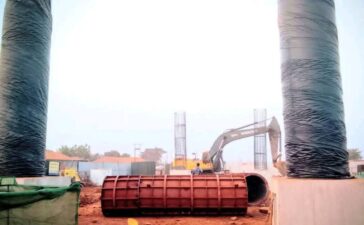Join our WhatsApp channel HERE for the latest Benue news and updates!
In a recent discussion with journalists in Makurdi, Engr. Peter Terwase Tortiv-Ato, a seasoned development expert and chartered civil engineer, strongly endorsed Benue State’s anti-open grazing law, describing it as a pivotal measure for driving agricultural and economic progress. Ato, who has worked extensively in Nigeria and the United Kingdom, emphasized that security is the foundation of development and that the ban on open grazing is a vital step toward addressing insecurity and fostering sustainable growth in the state.
Security: The Bedrock of Development
Ato highlighted the inseparable link between security and development, noting that persistent insecurity in Benue undermines agriculture, industrialization, and rural livelihoods. “Security is the bedrock of development. All sectors—economy, health, education—depend on it,” he stated. He pointed out that Benue’s agricultural sector, the cornerstone of the state’s economy, faces significant challenges due to threats that deter investment, disrupt supply chains, and limit market access.

“In the past, traders would come directly to Benue farms to purchase produce. Now, those arrangements have collapsed due to insecurity,” Ato explained, underscoring how fear and violence have disrupted traditional trade networks. He also shared an example of a community health center project funded by a wealthy benefactor that was abandoned before construction began due to attacks, illustrating how insecurity diverts resources from development to conflict management.
Strengthening the Anti-Open Grazing Law
While Ato supports the ban on open grazing, he criticized its inconsistent enforcement under the current administration. He called for a more robust and cohesive policy to ensure its effectiveness. To make the transition to ranching viable, Ato proposed establishing pilot ranches in each of Benue’s senatorial districts, equipped with veterinary services and training facilities to promote best practices in livestock management. He also suggested subsidies for cattle feed to ease the financial burden on herders during this shift, framing ranching as a pathway to prosperity rather than a restriction.
“Open grazing is no longer sustainable,” Ato argued, emphasizing that a well-implemented ban, coupled with practical support for ranching, could stabilize the livestock sector and reduce conflicts between farmers and herders.
A Vision for Agricultural and Industrial Growth
Beyond addressing grazing issues, Ato advocated for a comprehensive approach that integrates security with economic planning. He proposed intelligence-driven security measures to preempt threats, criticizing Nigeria’s centralized security architecture for its inefficiencies and lack of coordination. He also urged the government to implement temporary security measures to protect farmers during harvests and to purchase produce at market prices to prevent post-harvest losses. Such measures, he argued, would stabilize farmer incomes and sustain agricultural activity despite ongoing security challenges.
Ato also emphasized the need for industrialization to diversify Benue’s economy. He called for a focus on value addition and processing rather than raw production. “We need to approach our economy from an added-value perspective. What generates the most employment and social value?” he asked, highlighting the importance of industries that create jobs and support secondary businesses. By prioritizing sectors with high economic and social returns, Benue could unlock significant growth opportunities.
Addressing Displacement and Building Resilience
On the issue of internally displaced persons (IDPs), Ato stressed the importance of securing ancestral lands to enable communities to return home. He noted that while infrastructure development is critical, addressing the root causes of displacement—persistent insecurity and lack of rural safety—is essential for sustainable resettlement and development. Ato’s vision for Benue rests on three key pillars: security as a prerequisite for progress, value-driven industrialization, and community-centered strategies supported by national policies.
A Call for Political Will
Ato’s insights underscore the need for strong political will and practical, security-focused policies to unlock Benue’s potential. By strengthening the anti-open grazing law, investing in ranching, and prioritizing value addition, the state can protect its agricultural backbone, create jobs, and build resilient communities. His recommendations offer a roadmap for transforming Benue into a hub of agro-revolution and sustainable development.
As Benue navigates its challenges, Ato’s call for an integrated approach to security and economic planning serves as a timely reminder of the urgent need for actionable solutions to secure the state’s future.
Source: Daily Post Nigeria
















